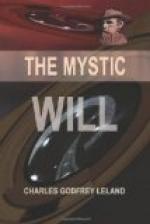Now, having for many years attempted at least to familiarize myself with the aspect or sound, of this problem, though I could not solve it, it seems at last to be natural enough that even matter (which so many persist in regarding as a kind of dust or something resistant to the touch, but which I regard as infinite millions of degrees more subtle), may think just as well as it may act in Instinct. It is, indeed, absurd to admit souls to idiots or savages, who have not the sense to live as comfortably as many animals, and yet deny it to the latter. When we really become familiar with the idea, it appears sensible enough. But its opponents do not become familiar with it, it irritates them, they call it Atheistic, although it is nothing of the kind, just as if we were to say that a man who bravely and nobly pursued his way in life, doing his duty because it was his duty, and giving no thought as to future reward or punishment, must needs want soul or be an Atheist.
If all men were perfectly good, they would act morally and instinctively, without consciousness of behaving well, and if we felt a high ideal of Art it would be just the same. When Art was natural men never signed their names to their work, but now the Name takes precedence of the picture.
Therefore, as we go backward into the night of things, we find, though we forget it all the time, that Instinct or the living in the Spirit of Law, had its stars or planets which shone more brilliantly than now, at least in Faith. Thus, there are two sources of Creation or Action, both based on Evolution, one being unconscious and guided by Natural Law, and the other which is conscious and grows out of the first. Hence cognito ergo sum, which well-nigh all men really understand as cogito, ergo sum Deus. Or we may say that they assume
“Because I think, then God must think like me!”
Now to come to Hypnotic thought, or suggested mental action. I would infer that, according to what I have said, there may be two kinds of mentality, or working of the mind—the one under certain conditions as effective or resultant as the other; the first being—as it was in the order of time—Unconscious or Instinctive; the other, conscious and self-observant.
For the man who built a Romanesque Cathedral worked by the suggestiveness of minds which went before him, or Tradition. He was truly, as it were, in a kind of slumber; indeed, all life was more or less of a waking dream in those dim, strange days. “Millions marched forth to death scarce knowing why,” all because they were told to do so—they felt that they must do it, and they did it. “Like turkeys led by a red rag,” says CARLYLE. And the red rag and the turkey is an illustration of Hypnotism in one of the books thereon. Instinct is Hypnotism.




